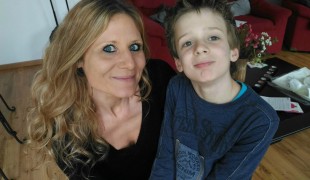- 6559
- 518
- 8
- 5
- 0
- Help Ukraine
About the solution
After Chris Benoit and Alexis Liddell’s grandmother had a stroke, she suffered memory loss.
This made communication with their grandmother become very difficult. "We struggled," said Alexis. "Communication was the toughest. We'd leave the visits with her feeling exhausted, frustrated, mad and sad. We figured we're not the only ones having trouble with this."
Alexis worked in therapeutic recreation, and her brother, Chris, was a software engineer. So, they realized that joining both their expertise they could create a solution that would help their grandmother, and other patients like their grandmother, communicate.
That is when they created the app Promenade. It allows patients, families and healthcare providers choose subjects like gardening, cooking or sports. After choosing a topic, several related photos and questions appear, in order to train the patient’s long-term memory, and get them talking.
"We know with dementia the short-term memories are the first to go but the long-term memories usually remain intact for a significantly longer portion of time," said Liddell. "So a lot of folks suffering from the disease can't remember what they had for lunch but they can remember specific details about high school or working on the farm when they were nine years old.
The app has caught the attention of therapists from across Canada, and both Chris and Alexis have had many requests to speak at conferences in Canada, where they have taken suggestions to refine the app.
"I spend a lot of time using it with my own grandmother," Alexis said. "I find it's the best and most effective way I can communicate with her. But we have a variety of homes all over Canada actually using it and the feedback has been amazing."
The app Promenade can be bought at Apple Store for $6.99.
Adapted from: http://bit.ly/2U65LOh
More info: https://apple.co/2MGdT7k
http://www.promenadeapp.com
This solution shall not include mention to the use of drugs, chemicals or biologicals (including food); invasive devices; offensive, commercial or inherently dangerous content. This solution was not medically validated. Proceed with caution! If you have any doubts, please consult with a health professional.
DISCLAIMER: This story was written by someone who is not the author of the solution, therefore please be advised that, although it was written with the utmost respect for the innovation and the innovator, there can be some incorrect statements. If you find any errors please contact the patient Innovation team via info@patient-innovation.com
-
-
512
-
0
-
6976

WatcHelp: Mom invents an app to increase the autonomy of her autistic son in the everyday life
COMMUNICATION: Communicating, whether by speaking, listening, or other means
CAREGIVING
Autism
Asperger's Syndrome
Alzheimer's Disease
Down Syndrome (Trisomy 21)
ADHD
App (Including when connected with wearable)
Anxiety
Gait abnormalities (e.g., walking difficulties, unsteady gait)
Difficulty concentrating or making decisions
Tremors
Muscle cramps or spasms
Difficulty coordinating movements
Stiffness or rigidity (difficulty moving)
Muscle weakness
Social withdrawal or isolation
Difficulty speaking or understanding speech
Cognitive impairment
Memory loss
Restlessness or feeling slowed down
Sleep disturbances
Difficulty controlling impulses
Hallucinations (perceiving things that aren't there)
Fatigue
Managing Neurological Disorders
Enhancing Mental Health
Caregiving Support
Child and Adolescent Psychiatry
General and Family Medicine
Medical Genetics
Neurology
Pediatrics
Psychiatry
France
-
-
-
544
-
0
-
8830

Student invents "epilepsy alarm" for his grandmother
CAREGIVING
COMMUNICATION: Communicating, whether by speaking, listening, or other means
Epilepsy
App (Including when connected with wearable)
Muscle cramps or spasms
Stiffness or rigidity (difficulty moving)
Loss of balance
Sleep disturbances
Anxiety
Twitching or involuntary movements (myoclonus)
Seizures
Managing Neurological Disorders
Enhancing Mental Health
To improve Treatment/Therapy
Preventing (Vaccination, Protection, Falls, Research/Mapping)
Caregiving Support
General and Family Medicine
Neurology
Psychiatry
Public Health
China
-
-
-
554
-
0
-
7302

Kenyan boy develops app to help people with depression
COMMUNICATION: Communicating, whether by speaking, listening, or other means
Social interaction
Depressive Disorders (Major Depression, Childhood Depression, Postpartum Depression)
App (Including when connected with wearable)
Anxiety
Social withdrawal or isolation
Depressed Mood
Feelings of guilt or worthlessness
Sleep disturbances
Enhancing Mental Health
To improve Treatment/Therapy
Caregiving Support
General and Family Medicine
Neurology
Psychiatry
Kenya
-
 en
en